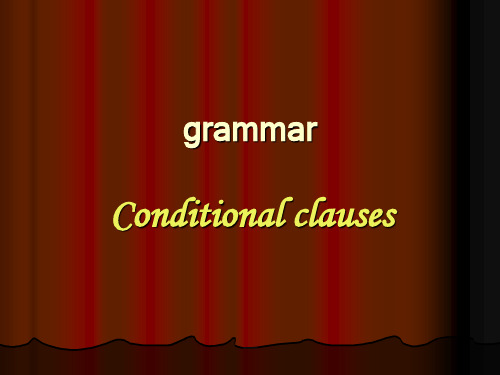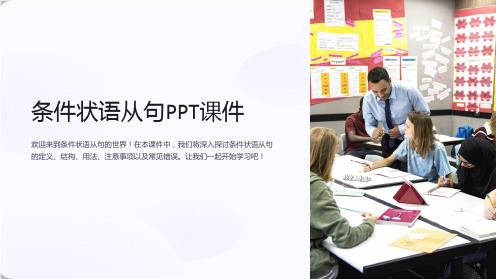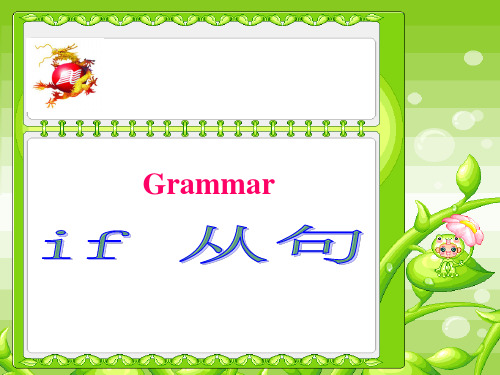条件状语从句 ppt课件
合集下载
初中英语条件状语从句课件

详细描述
教师可准备一些替换练习题,让学生反复练习,加深对条件状语从句的理解和记 忆。替换练习可以是将句子中的某些词语或表达方式进行替换,也可以是通过改 变句子的语境来让学生更好地理解条件状语从句的使用。
改写句子
总结词
通过改写句子,让学生深入理解条件状语从句的语法结构和 意义,培养其语言运用能力。
详细描述
2
“unless”:表示“除非”,引导一个否定条 件。
3
“on condition that”:表示“如果”,引导 一个肯定的条件下。
从句的构成
主语+谓语
从句的基本构成,表示一个完整的句子。
从属连词+主语+谓语
使用特定的从属连词连接主句和从句,构成完整的复合句。
主句与从句的时态关系
01
02
03
主将从现
主句使用将来时,从句使 用现在时。
主现从现
主句和从句都使用现在时 。
主过去从过去
主句使用过去时,从句使 用过去时。
03
条件状语从句的特殊用法
表示过去的虚拟条件状语从句
总结词
过去虚拟条件状语从句用于表达与过去事实相反的情况。
详细描述
通常使用“had+过去分词”的形式,如“If we had studied harder, we would have passed the exam.”( 如果我们之前学习更努力,我们会通过考试的。)
通过使用条件状语从句,可以描述主句动作发 生的前提条件或原因。
表达假设和推测
在某些情况下,使用条件状语从句可以表达假 设或推测的情况,以及其可能产生的结果。
3
强调因果关系
通过使用条件状语从句,可以强调主句动作和 从句动作之间的因果关系。
教师可准备一些替换练习题,让学生反复练习,加深对条件状语从句的理解和记 忆。替换练习可以是将句子中的某些词语或表达方式进行替换,也可以是通过改 变句子的语境来让学生更好地理解条件状语从句的使用。
改写句子
总结词
通过改写句子,让学生深入理解条件状语从句的语法结构和 意义,培养其语言运用能力。
详细描述
2
“unless”:表示“除非”,引导一个否定条 件。
3
“on condition that”:表示“如果”,引导 一个肯定的条件下。
从句的构成
主语+谓语
从句的基本构成,表示一个完整的句子。
从属连词+主语+谓语
使用特定的从属连词连接主句和从句,构成完整的复合句。
主句与从句的时态关系
01
02
03
主将从现
主句使用将来时,从句使 用现在时。
主现从现
主句和从句都使用现在时 。
主过去从过去
主句使用过去时,从句使 用过去时。
03
条件状语从句的特殊用法
表示过去的虚拟条件状语从句
总结词
过去虚拟条件状语从句用于表达与过去事实相反的情况。
详细描述
通常使用“had+过去分词”的形式,如“If we had studied harder, we would have passed the exam.”( 如果我们之前学习更努力,我们会通过考试的。)
通过使用条件状语从句,可以描述主句动作发 生的前提条件或原因。
表达假设和推测
在某些情况下,使用条件状语从句可以表达假 设或推测的情况,以及其可能产生的结果。
3
强调因果关系
通过使用条件状语从句,可以强调主句动作和 从句动作之间的因果关系。
条件状语从句PPT课件PPT课件PPT学习教案

A. but B. if D. or
C. and
第16页/共19页
34. It was raining heavily, _____ we decided to stay at home and watch TV.
A. unless B. if D. so
C. because
第17页/共19页
36.______ the dinner was all over, everyone helped wash the dishes. A. as long as B. When C. Before D. if
表示科学常识,经常性的动作 1.如果水被加热,它会变成蒸汽。 If water is heated, it turns to steam. 2. 如果我需要理发,我通常去我家附近的理发店。 If I need a haircut, I usually go to the barber’s near
条件状语从句
第13页/共19页
40. – Will you please give the dictionary to Jane? – Sure, I’ll give it to her _______ she
arrives here. A. before B. until C. because D. as soon as
A. doesn’t rain; go
B. won’t rain; will go
C. won’t rain; go
D. doesn’t rain; will go
2.—Do you know if ________ tomorrow morning? —No. I will call you if she ________ back.
条件状语从句完整课件(共14张PPT)

如果我们提出更优惠的条件,他就会在合同上签 字。
He won't be against us in the meeting providing (that) we ask for his advice in advance.
如果我们提前征求一下他的意见,他就不在会上 反对我们。
5. as ( so ) long as…. “只要…, 就… ” 表示 一种前提条件
I can tell you the truth on condition that you promise to keep a secret.
我可以告诉你真相,条件是你答应保守秘密。
You can pass the custom on condition that we have checked your luggage.你可以通过 海关,但条件是我们得检查完你的行李。
If +虚拟条件句,
1. If I were you,I would invite him to the party.
如果我是你,我会邀请他参加聚会。 I would have arrived much earlier if I had
not been caught in the traffic. 要不是交通堵塞,我本会来得早一些。 If it should be true, it would be silly to
down. 如果你考试不及格,你会让他失望的。
如果你作业做完了就可以回家了。 If you have finished the homework, you
can go home.
1. If 从句 (一般现在时), 主句 ( 一般现在时 )
表示科学常识,说明, 经常性的动作,倾向 自动会发生的事
He won't be against us in the meeting providing (that) we ask for his advice in advance.
如果我们提前征求一下他的意见,他就不在会上 反对我们。
5. as ( so ) long as…. “只要…, 就… ” 表示 一种前提条件
I can tell you the truth on condition that you promise to keep a secret.
我可以告诉你真相,条件是你答应保守秘密。
You can pass the custom on condition that we have checked your luggage.你可以通过 海关,但条件是我们得检查完你的行李。
If +虚拟条件句,
1. If I were you,I would invite him to the party.
如果我是你,我会邀请他参加聚会。 I would have arrived much earlier if I had
not been caught in the traffic. 要不是交通堵塞,我本会来得早一些。 If it should be true, it would be silly to
down. 如果你考试不及格,你会让他失望的。
如果你作业做完了就可以回家了。 If you have finished the homework, you
can go home.
1. If 从句 (一般现在时), 主句 ( 一般现在时 )
表示科学常识,说明, 经常性的动作,倾向 自动会发生的事
条件状语从句完整ppt课件

on condition that引导的条件状语从 句中,主句和从句的时态根据具体情 况而定。
03
时态在条件状语从句中 运用
主将从现原则
常见的引导词有
if, unless, when, as long as, in case等。
例子
If it rains tomorrow, we will stay at home.(如果明天下雨,我们就待在 家里。)
作用
条件状语从句用于表达条件、假 设、条件限制等,帮助阐明主句 中的情况或结果,增强语言表达 的逻辑性和准确性。
分类及特点
01
02
03
真实条件句
表达现实中可能实现的条 件,使用一般现在时或一 般将来时。
非真实条件句
表达与现实相反或不太可 能实现的条件,使用虚拟 语气。
隐含条件句
条件不直接表达出来,但 通过上下文或语境可以推 断出来。
特殊情况处理
如
表示与现在事实相反的虚拟语气,从句用一般过去时。
例子பைடு நூலகம்
If I were you, I would not do that.(如果我是你,我不会那样做。)
时态一致问题
在条件状语从句中,主句和从句的时态 要保持一致。
如果主句是过去时态,从句也要用相应 的过去时态。
例子:He would have finished his work if he had not been
针对性练习题
If I _______ (be) you, I _______ (not do) that.
练习2:Complete the sentences with the correct conditional clause. (用正确的条件状 语从句完成句子。)
条件状语从句课件知识讲解共28页文档

46、我们若已接受最坏的,就再没有什么损失。——卡耐基 47、书到用时方恨少、事非经过不知难。——陆游 48、书籍把我们引入最美好的社会,使我们认识各个时代的伟大智者。——史美尔斯 49、熟读唐诗三百首,不会作诗也会吟。——孙洙 50、谁和我一样用功,谁就会和我一样成功。——莫扎特
条件状语从句课件知识讲解
16、自己选择的路、跪着也要把它走 完。 17、一般情况下)不想三年以后的事, 只想现 在的事 。现在 有成就 ,以后 才能更 辉煌。
18、敢于向黑暗宣战的人,心里必须 充满光 明。 19、学习的关键--重复。
20、懦弱的人只会裹足不前,莽撞的 人只能 引为烧
条件状语从句PPT课件

避免滥用条件状语从句
在表达条件时,要根据具体语境和需要 判断是否使用条件状语从句,避免滥用。
总结与展望
通过本课件的学习,我们了解了条件状语从句的定义、结构、常见引导词、 使用要点、练习题目以及常见错误。希望能够帮助大家掌握条件状语从句的 正确使用方法,并在实际应用中取得更好的效果。
常见的条件状语从句引导词
1 如果
表示真实条件,通常与一般现在时连用,描 述可能发生的情况。
2 除非
表示反条件,通常与虚拟语气连用,描述只 有在某一特定条件下才会发生的情况。
3 既然
表示已知条件,通常用于对已知事实进行推 理或引出结论。
4 要是
表示假设条件,通常与虚拟语气连用,描述 与事实相反或不太可能发生的情况。
条件状语从句PPT课件
欢迎来到条件状语从句的世界!在本课件中,我们将深入探讨条件状语从句 的定义、结构、用法、注意事项以及常见错误。让我们一起开始学习吧!
什么是条件状语从句?
定义与作用
条件状语从句是表达条件的从句,用来说明某种条件成立时,主句将发生的情况。
基本结构
条件状语从句由一个状语从句引导词和一个主从句组成,其中状语从句在结构上与主句相互 独立。
搭配练习
根据所给的条件和结果,运用条 件状语从句构建完整的句子。
问答题
回答给出的关于条件状语从句的 问题,并提供合理的解释和例子。
注意事项及常见错误
1
虚拟语气的正确运用
2
当条件不成立时,要使用虚拟语气,但
要注意时态和语态的一致性以及与事实
相符。
3
避免歧义
在使用条件状语从句时,要注意上下文 的连贯性,避免造成句义模糊或歧义的 情况。
条件状语从句的使用要点
在表达条件时,要根据具体语境和需要 判断是否使用条件状语从句,避免滥用。
总结与展望
通过本课件的学习,我们了解了条件状语从句的定义、结构、常见引导词、 使用要点、练习题目以及常见错误。希望能够帮助大家掌握条件状语从句的 正确使用方法,并在实际应用中取得更好的效果。
常见的条件状语从句引导词
1 如果
表示真实条件,通常与一般现在时连用,描 述可能发生的情况。
2 除非
表示反条件,通常与虚拟语气连用,描述只 有在某一特定条件下才会发生的情况。
3 既然
表示已知条件,通常用于对已知事实进行推 理或引出结论。
4 要是
表示假设条件,通常与虚拟语气连用,描述 与事实相反或不太可能发生的情况。
条件状语从句PPT课件
欢迎来到条件状语从句的世界!在本课件中,我们将深入探讨条件状语从句 的定义、结构、用法、注意事项以及常见错误。让我们一起开始学习吧!
什么是条件状语从句?
定义与作用
条件状语从句是表达条件的从句,用来说明某种条件成立时,主句将发生的情况。
基本结构
条件状语从句由一个状语从句引导词和一个主从句组成,其中状语从句在结构上与主句相互 独立。
搭配练习
根据所给的条件和结果,运用条 件状语从句构建完整的句子。
问答题
回答给出的关于条件状语从句的 问题,并提供合理的解释和例子。
注意事项及常见错误
1
虚拟语气的正确运用
2
当条件不成立时,要使用虚拟语气,但
要注意时态和语态的一致性以及与事实
相符。
3
避免歧义
在使用条件状语从句时,要注意上下文 的连贯性,避免造成句义模糊或歧义的 情况。
条件状语从句的使用要点
初中条件状语从句公开课课件(共35张PPT)

四、if的两面性
if引导条件状语从句时意为“如果”,如果引导宾语从句则意为“是否”, 放在谓语动词之后。请比较:
1) We will go out if it is fine tomorrow.
2) I don’t know if the train has arrived.
A joke
• A man liked a girl very much and asked if the girl could marry him. But the girl didn’t agree. She said ,“ if there is only one man left, I will marry you.”
buy lots of delicious food.
2. if 条件状语从句中,如果主句有 must,can,may 等情态动词,从
句用_一__般_现__在__时___。
例如:You must stop if the traffic light _is___ (be) red.
“主情从现”
If you feel hungry,
if
will
she, call me, I, tell her about it
If she calls me, I will tell her about it.
he ,come, next weekend, I ,tell you If he comes next weekend, I will tell you.
if 引导的条件状语从句时态
主将从现 祈使句 情态动词
I will sing a song if I am happy.
Don’t cross the road if the light is red You must stop if the traffic light
高中英语 高中条件状语从句讲解(共17张ppt )

03 in case 以防,假使
You can borrow my car in case you promise not to drive too fast. 假如你答应不开得太快,我就可以把车借给你。
04 providing/provided that 如果
He’s welcome to come along,provided that he behaves himself. 只要他规矩点,他一起去是受欢迎的。
or young chicks,they don't use a nest.
A. why
B. how
C. unless
D. where
②You must keep on working in the evening,________ you are sure you can
finish the task in time.
A.Once
B.If
C.Because
D.Unless
3.
you can sleep well, you will lose the ability to focus, plan and stay motivated after one or two
nights.
A.Once
B.Unless
C.If
hard togeth
C.as long as
D.for fear that
we Chinese work
2.
you try to do something beyond what you have already mastered, you will never grow.
特殊引导词 as/so long as(只要) only if(只有) providing/provided that (如果) suppose/supposing that(假设) in case(以防,假使) on condition that(条件是)
You can borrow my car in case you promise not to drive too fast. 假如你答应不开得太快,我就可以把车借给你。
04 providing/provided that 如果
He’s welcome to come along,provided that he behaves himself. 只要他规矩点,他一起去是受欢迎的。
or young chicks,they don't use a nest.
A. why
B. how
C. unless
D. where
②You must keep on working in the evening,________ you are sure you can
finish the task in time.
A.Once
B.If
C.Because
D.Unless
3.
you can sleep well, you will lose the ability to focus, plan and stay motivated after one or two
nights.
A.Once
B.Unless
C.If
hard togeth
C.as long as
D.for fear that
we Chinese work
2.
you try to do something beyond what you have already mastered, you will never grow.
特殊引导词 as/so long as(只要) only if(只有) providing/provided that (如果) suppose/supposing that(假设) in case(以防,假使) on condition that(条件是)
条件状语从句PPT课件

条件状语从句
二、时态问题
在条件状语从句中,要注意" "的规定,即 主句用一般将来时,从句用一般现在时表示将来时。
I will come to see you if I have time. 我有时间,我就来看你。 常见考法
主将从现
对于条件状语从句的考查,多以单选和完形填空的形式,从 时态的角度设题,考查学生灵活运用的能力,或从连词的意义角 度让大家选择连词。
1、引导条件状语从句最常用的连词是if,由if引导的条 件状语从句表示在某种条件下某事很可能发生。
If you ask him, he will help you.
如果你请他帮忙,他会帮你的。
If you fail in the exam, you will let him down.
如果你考试不及格,你会让他失望的。
难点
各种从属连词的含义 及用法比较;
难点
状语从句的时态问题;
常考点
时间状语从句, 让步状语从句, 条件状语从句
Back to school
引导条件状语从句的连接词主要有: if(如果)、unless(除非)或 as long as(只要)等。unless在意思上等于 if...not。
条件状语从句
• 34. It was raining heavily, _____ we decided to stay at home and watch TV. A. but B. or C. because D. so
• 36.______ the dinner was all over, everyone helped wash the dishes. A. How B. When C. Before D. Why
《条件状语从句》ppt课件

时间状语从句的引导词包括:when 、while、as、after、before等;条 件状语从句的引导词包括:if、 unless、as long as、on condition that等。
时间状语从句通常放在主句之前或之 后,并用逗号隔开;而条件状语从句 通常放在主句之前,不用逗号隔开。
与原因状语从句关系
与过去事实相反:If I had known the answer, I would have told you. (如果我早知道答案,我就会告诉你了。 )
06
与将来事实相反:If it rained tomorrow, we would stay at home. (如果明天下雨,我们就呆在家里。)
倒装结构通常用于强调条件状语从句中的 某个成分,或使句子更加简洁明了。
避免歧义
语境依赖
在使用省略和倒装结构时,要确保句子意 思明确,避免产生歧义。
省略和倒装现象往往依赖于特定的语境,需 要根据上下文来判断是否适用。
05
条件状语从句与其他从句关系
与时间状语从句关系
时间状语从句表示主句动作发生的时 间,而条件状语从句表示某个条件, 当该条件满足时,主句动作才会发生 。
例子
If you heat ice, it melts. (如果你给 冰加热,它会融化。)
非真实条件句
结构
If + 简单句(一般过去时/过去完成时),主句( would/should/could/might + 动词原形)。
例子
If I were you, I would not do that. (如果我是你,我不会 那样做。)
03
条件状语从句时态与语态
时态一致原则
if条件状语从句-课件(共31张PPT)

hard-working
get good grades
If she is hard-working,
she will get good grades.
Look and say
sunny this Sunday
go fishing .
If it is sunny this Sunday, I’ll go fishing .
• 读下列例句,试着自己总结if 的用法:
• 1. If you heat metal, it melts. • 如果把金属加热,它就会融化。 • 2.Water turns into ice if you cool it. • 如果你冷却水,它就会变成冰。 • 3.If you stand in the rain, you get wet.
A if; Whether B whether; Whether
C if; That D if ; If
3. Please tell her my telephone number if she _____ (want) to know.
wants
4. Will you come and stay with us for a while if you
“如果”。
If 引导的宾语从句可以用将来时,意思为“是
否”。
如果
Betty will visit the History Museum if it __d_o_e_s_n_’_t_r_ai_n_ (rain) tomorrow.
Ben wants to know if it____w_il_l b_e____ (be) fine tomorrow.
P105 B
• William has five problems • Give him some advice from column A and B
get good grades
If she is hard-working,
she will get good grades.
Look and say
sunny this Sunday
go fishing .
If it is sunny this Sunday, I’ll go fishing .
• 读下列例句,试着自己总结if 的用法:
• 1. If you heat metal, it melts. • 如果把金属加热,它就会融化。 • 2.Water turns into ice if you cool it. • 如果你冷却水,它就会变成冰。 • 3.If you stand in the rain, you get wet.
A if; Whether B whether; Whether
C if; That D if ; If
3. Please tell her my telephone number if she _____ (want) to know.
wants
4. Will you come and stay with us for a while if you
“如果”。
If 引导的宾语从句可以用将来时,意思为“是
否”。
如果
Betty will visit the History Museum if it __d_o_e_s_n_’_t_r_ai_n_ (rain) tomorrow.
Ben wants to know if it____w_il_l b_e____ (be) fine tomorrow.
P105 B
• William has five problems • Give him some advice from column A and B
- 1、下载文档前请自行甄别文档内容的完整性,平台不提供额外的编辑、内容补充、找答案等附加服务。
- 2、"仅部分预览"的文档,不可在线预览部分如存在完整性等问题,可反馈申请退款(可完整预览的文档不适用该条件!)。
- 3、如文档侵犯您的权益,请联系客服反馈,我们会尽快为您处理(人工客服工作时间:9:00-18:30)。
定义:
在复合句中由从句表示的状语 称作状语从句,它可以用来修 饰谓语(包括非谓语动词)、 定语或状语,或是整个句子。
准确掌握每一个连词的含义 是掌握状语从句的关键。
同时要注意主从句的时态呼应。
状语从句一般分为九大类
状语从句类别:
时间状语从句 地点状语从句 原因状语从句 目的状语从句 结果状语从句 条件状语从句 方式状语从句 比较状语从句 让步状语从句
We are cleaning the classroom while they are playing the football.
The soldier faces the powder while the beauty powder the face.
While I am washing the floor, you can be cleaning the windows.
When I opened the window, I saw him come up.
When I have time , I will go to see you.
When I came home, I met an old schoolmate of mine.
He said he would tell her about it when he saw her.
1.时间状语从句: 引导时间状语从句的连词有:
when, while, as, the moment, before, after, till, until, since, as soon as 等。
请注意 when, while, as 的区别
When ---当……时候, 通常指 某一特定的时间点,主句与从 句的动作同时发生。
Someone knocked at the door when I was having breakfast.
When I was leaving the house, the postman arrived.
When=after
When the children had gone to bed, she began to prepare her lessons.
He ran off before I could stop him.
It was not long before I forgot it all.
(It was /will be …before… 是常用句型)
After --- 在…… 之后
The customer left the ticket counter after he had a quarrel with the ticket agent.
Wh in America, we saw him twice.
While we were talking, he came in. Strike while the iron is hot.
While ---表示一种不满情绪, 意思是这边在干某种重要的事, 而另一边在享受等。
The plane took off after the air traffic controller gave clearance.
Not …until 可以和 when 互换
Before --- 在……之前
The passengers should arrive at the airport an hour before the flight departs.
Did you work as a stewardess before you come to this company?
*注意:在时间状语从句中,主 从句都是将来的动作或状态时, 习惯上主句用将来时,从句用 一般现在时。
When --- 正在……的时候,突 然…。通常主句是进行时或 be about to 时,在翻译的时候, when 可以译成没想到或突然。
I was walking along the street , when I met him.
As I was going out, it began to rain.
I saw Mary as she was going on the bus.
As he was eating his breakfast, he heard someone knock at the door.
Someone patted me on the shoulder as I was standing before the shop window.
I was about to fall asleep when my sister came in.
One evening, little Hans was sitting near the fire when he heard a loud knock at the door.
When 当从句是进行时,主句 是一般时,往往表示不满。
As --- 一边……一边, 随着 She was doing her homework as she was listening to the music.
As she grew older, she became more beautiful.
As --- 当……时,指一个动作 紧接着一个动作发生,从句通 常用进行时。
The moment --- 一……就…… =as soon as , immediately,
---Did you remember to give Mary the money you owed her?
---Yes, I gave her the moment I saw her.
Not… until --- 直到……才 He didn’t leave the office until he finished the work. =He left the office when he finished the work.
在复合句中由从句表示的状语 称作状语从句,它可以用来修 饰谓语(包括非谓语动词)、 定语或状语,或是整个句子。
准确掌握每一个连词的含义 是掌握状语从句的关键。
同时要注意主从句的时态呼应。
状语从句一般分为九大类
状语从句类别:
时间状语从句 地点状语从句 原因状语从句 目的状语从句 结果状语从句 条件状语从句 方式状语从句 比较状语从句 让步状语从句
We are cleaning the classroom while they are playing the football.
The soldier faces the powder while the beauty powder the face.
While I am washing the floor, you can be cleaning the windows.
When I opened the window, I saw him come up.
When I have time , I will go to see you.
When I came home, I met an old schoolmate of mine.
He said he would tell her about it when he saw her.
1.时间状语从句: 引导时间状语从句的连词有:
when, while, as, the moment, before, after, till, until, since, as soon as 等。
请注意 when, while, as 的区别
When ---当……时候, 通常指 某一特定的时间点,主句与从 句的动作同时发生。
Someone knocked at the door when I was having breakfast.
When I was leaving the house, the postman arrived.
When=after
When the children had gone to bed, she began to prepare her lessons.
He ran off before I could stop him.
It was not long before I forgot it all.
(It was /will be …before… 是常用句型)
After --- 在…… 之后
The customer left the ticket counter after he had a quarrel with the ticket agent.
Wh in America, we saw him twice.
While we were talking, he came in. Strike while the iron is hot.
While ---表示一种不满情绪, 意思是这边在干某种重要的事, 而另一边在享受等。
The plane took off after the air traffic controller gave clearance.
Not …until 可以和 when 互换
Before --- 在……之前
The passengers should arrive at the airport an hour before the flight departs.
Did you work as a stewardess before you come to this company?
*注意:在时间状语从句中,主 从句都是将来的动作或状态时, 习惯上主句用将来时,从句用 一般现在时。
When --- 正在……的时候,突 然…。通常主句是进行时或 be about to 时,在翻译的时候, when 可以译成没想到或突然。
I was walking along the street , when I met him.
As I was going out, it began to rain.
I saw Mary as she was going on the bus.
As he was eating his breakfast, he heard someone knock at the door.
Someone patted me on the shoulder as I was standing before the shop window.
I was about to fall asleep when my sister came in.
One evening, little Hans was sitting near the fire when he heard a loud knock at the door.
When 当从句是进行时,主句 是一般时,往往表示不满。
As --- 一边……一边, 随着 She was doing her homework as she was listening to the music.
As she grew older, she became more beautiful.
As --- 当……时,指一个动作 紧接着一个动作发生,从句通 常用进行时。
The moment --- 一……就…… =as soon as , immediately,
---Did you remember to give Mary the money you owed her?
---Yes, I gave her the moment I saw her.
Not… until --- 直到……才 He didn’t leave the office until he finished the work. =He left the office when he finished the work.
